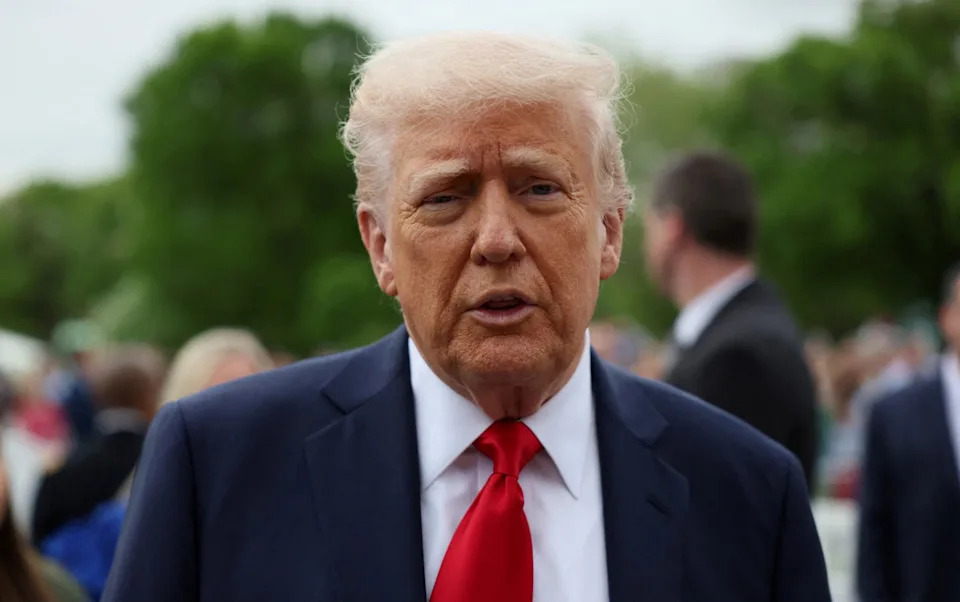
Surging government borrowing around the world, triggered by Donald Trump’s trade war, risks fresh bond market chaos, the International Monetary Fund (IMF) has warned.
The IMF said Mr Trump’s tariffs were expected to force governments to borrow more heavily to cope with an expected global economic slowdown. However, a flood of new debt issuance could trigger more instability in debt markets , the fund warned.
“Further turbulence could descend upon sovereign bond markets, especially in jurisdictions where government debt levels are high,” the IMF warned in its Global Financial Stability Report.
The warning comes two and a half years after carnage swept British markets in the wake of Liz Truss’s high-borrowing mini-Budget , which wrecked faith in the UK’s ability to run its finances, and after France churned through four prime ministers in 2024 amid a rolling battle with its budget and the debt markets.
Some market observers have warned America risks a “Donald Truss” moment as the president risks forcing the world’s largest economy into recession with his tariffs on imports from the rest of the globe.
His efforts to reshape the world economy have already led to steep slumps in stock markets, a drop in the US dollar and growing concerns that American debt may lose its status as the ultimate safe asset in times of global economic turmoil.
The IMF noted that government debts have already risen to 93pc of global GDP , up from 78pc a decade ago, risking “elevated volatility” in bond markets. Levels of indebtedness in the US and Germany pose particular risks, the IMF said.
America’s “persistent fiscal deficits” at a time of “rising interest costs” risk an upward spiral in borrowing costs, the IMF warned.
On top of that, the US is in a tight spot as the trade war pushes up inflation but hits growth, leaving the central bank trapped between cutting interest rates to support the economy or raising borrowing costs to keep a lid on price rises.
The Federal Reserve faces “a challenging trade-off ... in lowering inflation pressures and buttressing a slowing economy”, the IMF said.
Jerome Powell, the US Federal Reserve chairman, has made clear over the last week that he plans to prioritise tackling inflation ahead of supporting the economy, provoking Mr Trump’s rage. The president has publicly called for Mr Powell to change course and lower interest rates and is studying whether he can sack the Fed chief .
Assessing the world as a whole, the IMF said: “Major advanced economies will likely issue more bonds to finance enlarging fiscal deficits at a time when bond market functioning has become more challenged. Investor concerns about public debt sustainability and other fragilities in the financial sector can worsen in a mutually reinforcing fashion.
“In the eurozone, net issuance of government bonds is also set to ratchet up, mainly driven by the need to finance higher defence and infrastructure spending.”
In particular, that means Germany, whose government has ditched its very cautious debt rules and agreed to borrow more in an effort to rearm the military and boost the wider economy.
The result is higher borrowing costs in what is usually seen as the eurozone’s safest debt market: Bunds, as German government bonds are known. That in turn sets the tone for market interest rates across the rest of the currency zone.
“Given the Bund’s role as the key pricing benchmark for European sovereign debt, higher Bund yields translate into higher borrowing costs across the eurozone,” the IMF said.
“Going forward, potential risks from higher borrowing costs for eurozone sovereigns should continue to be monitored.”
There are further dangers in stock markets where, despite recent drops, the IMF said there is room for share prices to fall further.
It warned: “Valuations of US stocks are still lofty, and further price corrections are possible. The current valuation levels require persistently robust growth in earnings over the medium term, an increasingly difficult feat amid elevated economic and trade uncertainty.”
It also cautioned that banks, facing strain from turmoil in financial markets, may not be as strong as they appear.
There is a danger that the capital buffers built up since the financial crisis may be based on calculations which “underestimate the true level of risk and make banks seem safer than they actually are”, the IMF said.
Broaden your horizons with award-winning British journalism. Try The Telegraph free for 1 month with unlimited access to our award-winning website, exclusive app, money-saving offers and more.
